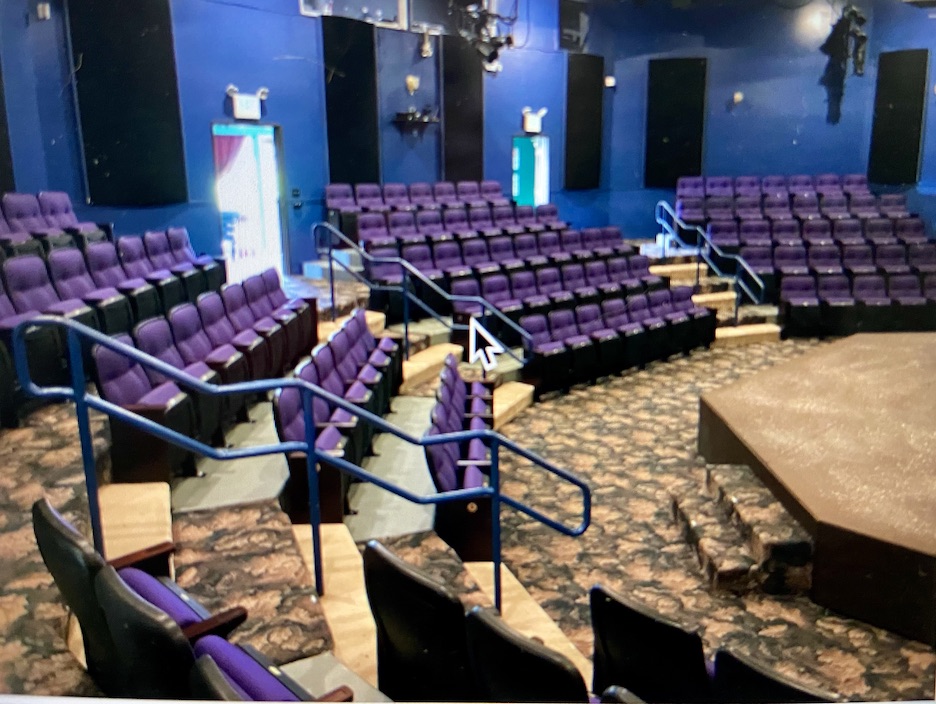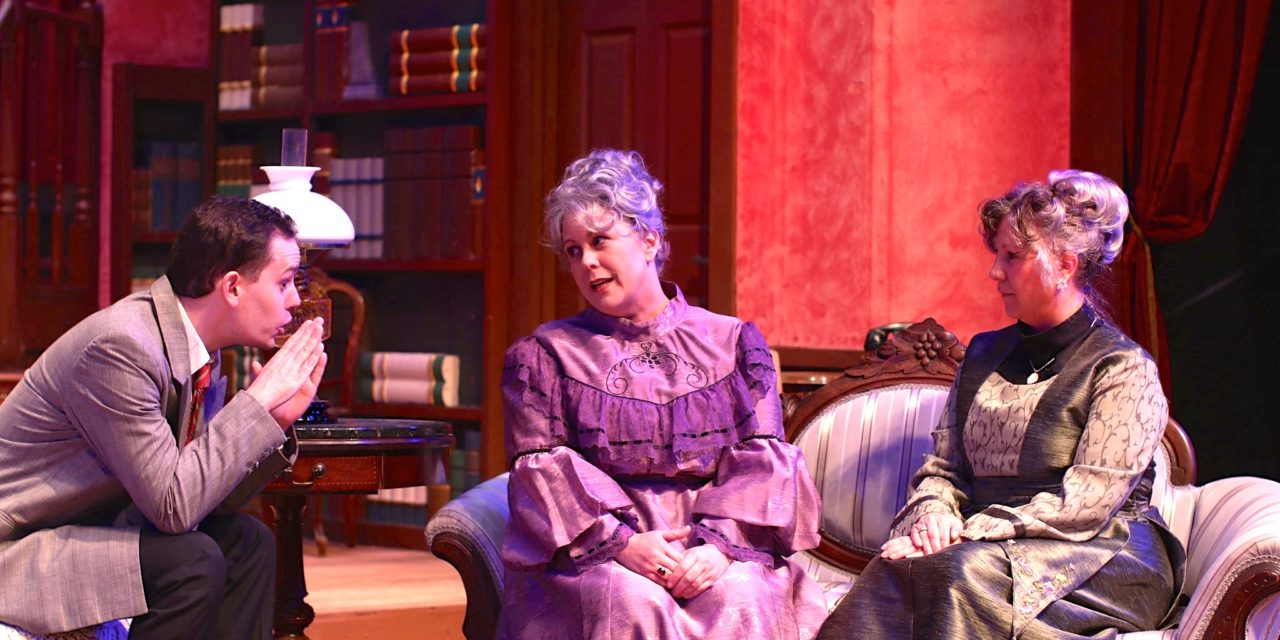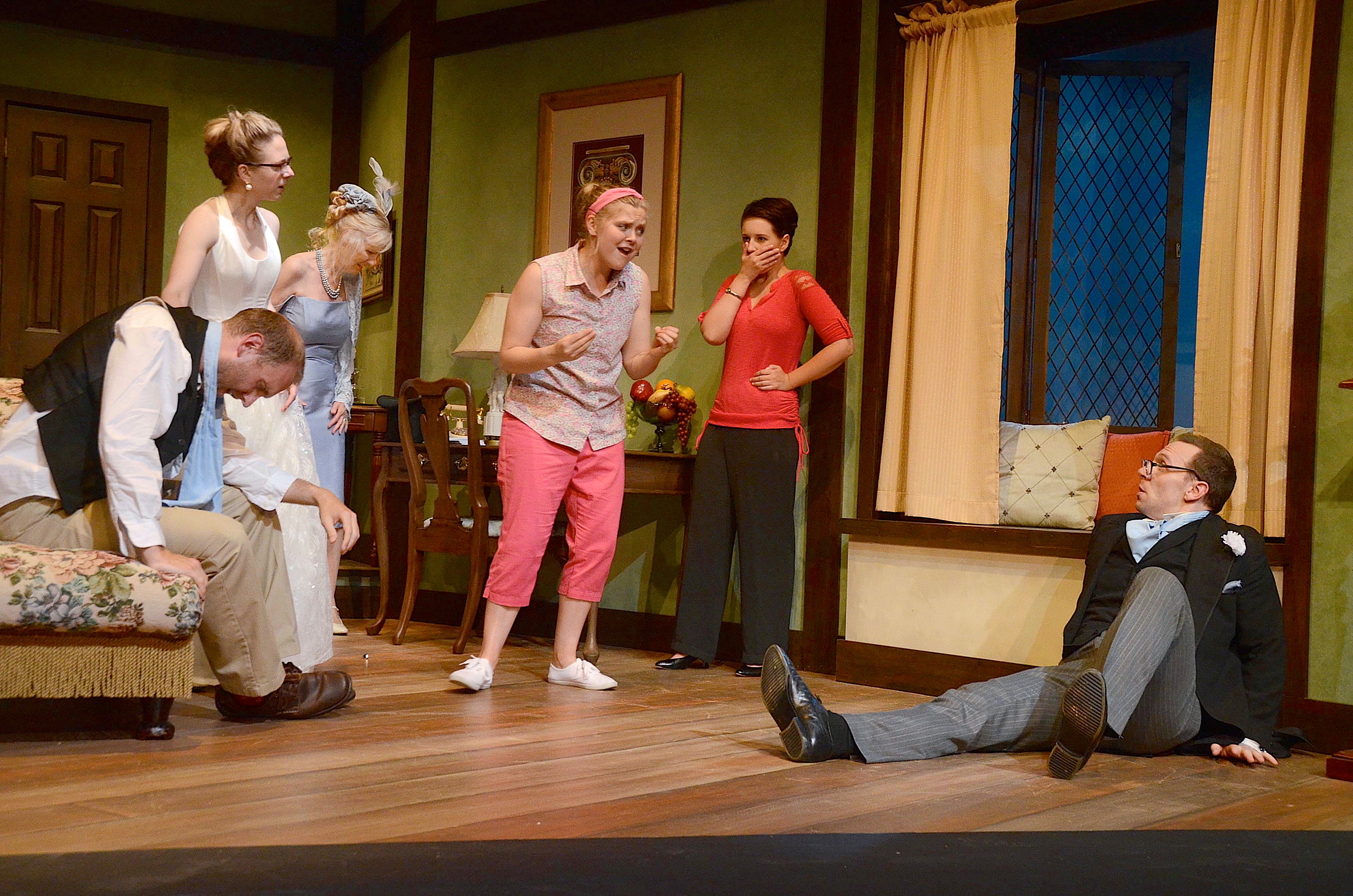(Above: Arsenic and Old Lace was the last play on the Cottage Theatre stage, in February, before the coronavirus pandemic shut down the rest of the 2020 theater season. From left to right, Nephew Mortimer Brewster (Kory Weimer) visits his homicidal aunts Martha and Abby (Marcee Shriver Long and Nikki Pagniano); photo by Emily Bly)
By Randi Bjornstad
If 2020 were a year like any other, the Cottage Theatre in Cottage Grove would be in the middle of rehearsals right now for its fifth production of the season, The Hunchback of Notre Dame, which had been set for October.
But as everyone knows, 2020 has not been a year like any other. Cottage Theatre put on its first show of the year, Arsenic and Old Lace in February, as planned. But by April, when Mamma Mia was supposed to hit the boards, the coronavirus pandemic had swept the world, and nothing since has been the same as before.
That means no Seeking Red, no You’re a Good Man, Charlie Brown, no The Hunchback of Notre Dame, and no Elf the Musical, at least not before the middle of 2021, at best.

Susan Goes, executive director of Cottage Theatre; photo from cottagetheatre.org
“I’m still here, still coming to work every day,” Susan Goes, executive director of the Cottage Theatre, says. “When we did Arsenic in February, we were blissfully ignorant of what was to come. By mid-March we had the governor’s order, and like everyone else, the rest of the season was out of our hands.”
The situation did take a toll on the theater’s operations. While her position remains, Goes is now the sole employee of Cottage Theatre.
“I had a half-time assistant, but fortunately, just before the coronavirus situation happened, she had just gotten a good job offer and quit here, so that meant we could put that position on hold. But because we were not doing performances, we did have to furlough the ticket office people.”
Since then, the theater has been in “hibernation strategy,” Goes says, but much as everyone misses the adrenalin rush of preparation and production, Cottage Theatre finds itself in a fairly good place as it plans for a much-desired return to the stage in June 2021.
“The way we look at it, theater is extremely important to a healthy society, but not as important as people’s lives, so we are using this time to re-evaluate and plan our way forward,” she says.
Time to regroup
In fact, the last in-person board of directors meeting after the coronavirus hit took place on March 16, and shocking as that was, “I don’t think that was as hard on the board members as our May 2019 meeting, when we had to put our major building project on hold. So we have been able to use this time to rein in expenses, re-plan the construction project, and get ready for when we can reopen.”
Cottage Theatre has been working toward a major capital project for the past several years, including a substantial overhaul of a seating arrangement that worked when the theater on Village Drive was built in 1998 but which no longer serves the much larger, more ambitious productions — including musicals — that the troupe now routinely stages.
“We realized we needed to do something when we looked at our costs and revenues,” Goes recalls. “We sold out all our shows on a regular basis, which made increasing the number of seats important in order to increase our revenues. The only other option was to raise ticket prices significantly, which we didn’t want to do. We are very sensitive to the Cottage Grove community and would not want to be charging admission that local people couldn’t afford — that just wasn’t a choice.”
The theater had won sizable grants in both 2017 and 2019, totaling about $500,000, through the state Cultural Advocacy Coalition, which works to increase public support — including funding from the state Legislature and economic development money from the state lottery — for arts and cultural activities and programs throughout Oregon.
“After the coronavirus problem began, we lost about $60,000 of the second grant because of declining state revenues related to the pandemic,” Goes says. At the same time, delaying the project was not an option, “because we have grant funding that has to be completed by the end of June 2021, or we could lose it altogether.”
Fortunately, despite the shutdown of the 2020 season and the loss of that ticket revenue, two aspects of Cottage Theatre’s financial situation make that timeline possible. First, Goes says, is the theater’s good fortune in having an astute and careful treasurer, “who always has advised us to have no ongoing debt and who also says it’s important to keep at least six months of funding in reserve. So we are pretty good about not spending money. And, thanks to him we have been lucky through all this and also, frankly, a little bit smart.”
As part of their cautious approach, before beginning construction, the theater group took the step of double checking the the cost of the project, “and the new bids came in way higher than the original estimate of $1.5 million,” Goes says, “so we were able to begin with some modest changes while we continued our capital campaign.”
A huge factor in the theater’s favor is that by far the greatest part of the $2.3 million estimated cost of the reconstruction project has come from individual donations and grants from private foundations.
“We are fortunate that since the coronavirus hit, we still have received $400,000 in new commitments,” Goes says. “Our target is to raise the remainder by the end of 2020, start the remodel in January 2021, and open our season in June.”
Future hopes
When that happens, the lineup hopefully will pick up where it had to leave off, with a production of Mamma Mia, based on the music and story of ABBA, the internationally popular Swedish pop group that formed in 1972, creating its name from the first letters of the group’s first names — Agnetha, Björn, Benny, and Anni-Frid — and whose songs topped the musical charts from 1974 to 1983.

Left to right, Kathryn Pearson, Sophie Blades, Tracy Nygard, Kory Weimer, Randall Brous, Tony Rust and Glenn Rust make up the cast of “The Good Doctor,” onstage at the Cottage Theatre in August 2017; Seeking Red, written by Glenn Rust, may appear on the Cottage Theatre stage in 2021; photo by Emily Bly
“That would be the best possible option, and we hope that the same cast members would be available, because we already had gotten so far into the process,” Goes says. “But we know we might have to rethink things based on the situation by then of the coronavirus. Instead of a musical, we might have to go to a drama with a small cast, which probably would be Seeking Red, to minimize the chance of spreading droplets that would be much greater with a musical. We’ll have to read the tea leaves when we get there and see what will be best.”
Seeking Red has its own special affiliation with the Cottage Theatre, Goes says. “The playwright is Glenn Rust, who basically grew up in our theater, and we had scheduled this as the West Coast premiere of his play. His dad, Tony Rust, also has been very active in many of our productions, both onstage and backstage.”
Because of the uncertainties, though, Cottage Theatre will not be selling season tickets for 2021, so the order and choice of plays could be a bit up in the air, “because we don’t know what the variables of the coronavirus will be during the season, so we need to be flexible with what we choose to do.”
Cottage Theatre grows up
Goes has plenty of experience rolling with theatrical punches. Her activity in theater began in high school and continued through college into early adulthood. She majored in music in college, with an emphasis in musical theater, and followed that with a degree in arts management.
She took several years off when her children were young, and she got back into the theater world when Cottage Theatre was doing Oliver, “and my son was 9, so I thought wouldn’t it be fun if we both could be in the show,” Goes recalls. “We did both get in, and after that I started as a volunteer, and then in 2007 I became executive director.”
Cottage Theatre dates back to 1982, long before Goes’ involvement, “and it started outside when somebody had an old Army parachute, and people put it up with tent stakes on the lawn of the Village Green (motel and restaurant), and put on a show,” she says. “On the second weekend there was a big windstorm, and it blew the ‘tent’ away.”
After that, the theater group rented a “small shack of a building that had been a health food store and before that a little church which had a raised area for the altar that became the stage,” Goes says. “Eventually, it was announced that Walmart wanted to build right next door, so the owner of the property didn’t want to keep on letting the theater use it, but the supporters of the theater said they would help raise money for a building.”
The result was the Cottage Theatre at 700 Village Drive, originally constructed in 1998 and expanded in 2006.
“The first time I walked into the theater back then, I could see that the lobby was really cramped and not very workable,” Goes says with a laugh. “I thought to myself, ‘I’m not going to tell anybody I have theater management background, because I’ll end up getting sucked into running the place.’ “
That, of course, was exactly what happened.
“The first couple of years were tough — the entire operation was all-volunteer, there was no balance sheet, and the cash flow was very uneven,” Goes says. But once she took charge of day-to-day operations, the situation improved. By 2009, the Cottage Theatre had paid off its mortgage. Since 2010, its shows have become routine sell-outs.
What’s next
If all goes as planned, by mid-2021 the next iteration of the Cottage Theatre will be complete. The unpopular far-left and far-right seats that flank the stage and have less than desirable views of the stage and actors will be gone.
“We decided that it didn’t make financial sense to move the walls out to create more space, so what will happen instead is that we will ‘re-rake’ the seating, making it steeper and actually being able to add more rows,” Goes says. “We will redo the stage, and we will be able to have small ‘wings’ on the side that we can use for small scenes while not interfering with the overall stage set.
“But we won’t be changing the basic size of the theater,” she says. “We did a big audience survey of our theater patrons, and what they overwhelmingly said is that they love the intimacy of the relationship between audience and the stage. That will not change.”
What does need to change, of course, is the public health situation that has decimated the seasons for arts groups throughout the nation and the world.
“I’ve been watching the news around the country, and I’m taking the really long view,” Goes says. “I am convinced that people will come out of this difficult time, and they will still want to attend live events. We have had many difficult times before in this country, and sometimes it has taken years to recover from them. I believe that we can do it, too.”

The Cottage Theatre sits idle during the coronavirus pandemic. Before the theater opens again, perhaps in June 2021, a major reconstruction of the facility will take place, with improvements to the stage and seating areas; photo from cottagetheatre.org








